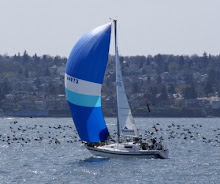Here we are nearing the end of another week. The weather is improving each week. Last weekend I had plans to get out to take more photos, weather permitting, but that was not to be. It looked promissing Saturday morning but clouded over by afternoon, so I cancelled going out that day. As a result, I spent that day behind the computer doing research. Sunday was overcast all day but warm. Again, because of the cloud (for me I love sun and blue skies, though some cloud adds interest), I spent the day indoors mostly. I got caught up with the rest of the laundry having done most of it on Friday evening after arriving home from work. The balance of the time was spent behind the computer and in the kitchen.
This brings me to Klondike Rose, and before your thoughts go to the Yukon in northwestern Canada, let me tell you I'm talking about a potato, called "Klondike Rose." Its got rose-coloured skin and a gold flesh similar to another potato variety called "Yukon Gold." This brings me to the subject of what I was busy doing in the kitchen. I was cooking up the potatoes, skin and all, for making potato salad. After the potatoes cooled, I removed the skin, cut them up into slices, finely diced an onion, chopped up a tomato and then prepared an olive oil and white wine vinegar dressing to which I added a little bit of prepared dijon mustard (with horseradish). I added a bit of sea salt and freshly ground pepper to the dressing, mixed it and then added the dressing to the salad. This was mixed and left in the fridge overnight. I had potato salad at work two days in a row, a departure from sandwiches each day.
There is one thing though that is of concern. The usual varieties I buy tend to sprout after a time as I would consider normal. After two weeks, these potatoes have shown no signs of sprouting. This led me to do a little research and I found that these potatoes (considering their origin) have been "treated" to prevent sprouting, in other words given a dose of radiation. Doubtless, I'll likely not use them again and opt instead for varieties of potatoes not treated in this way.
Now I'm about to head out to work once again but I'm looking forward to the weekend where I hope to head up to Burnaby Mountain to check out the cherry trees in blossom. Then I might head over to Stanley Park to see the rhododendrons. We shall see what the weekend brings! Meantime, have a great weekend when you get to yours!!! - V.
Hairy Muscle Hunk Model Ken Karikas, First Look!
-
[image: Hairy Muscle Hunk Model Ken Karikas 7]
The post Hairy Muscle Hunk Model Ken Karikas, First Look! appeared first on Nude
Men, Nude Male Models, & Ga...
11 hours ago

























m.jpeg)



-3.jpg)














2 comments:
Almost all potatoes are treated with Sprout Inhibitors. Not "Radiation". Otherwise potatoes would only last till about December and you wouldn't be able to buy them till summer.
It is true that sprout inhibitors (such as chlorpropham as an example) are widely used but irradiation (with gamma rays) has also been approved here in Canada and such irradiation is used to increase the shelf life of various kinds of produce and meat.
But that being said, I am not in favour of either method because of the possible negative health effects on humans. It all ends up in the environment with no way to get rid of it with current technology. The use of either method just increases the shelf life as I mentioned but also increases the profits for companies that buy the produce from the farmer.
Aside from the health question, inhibiting tubers from sprouting also has the advantage of the farmer not being able to use some of those tubers to grow a crop, but it certainly would prevent the homeowner from growing their own in their back garden. All that is another story and not for discussion on this blog. There are plenty of other venues for that! - V.
Post a Comment